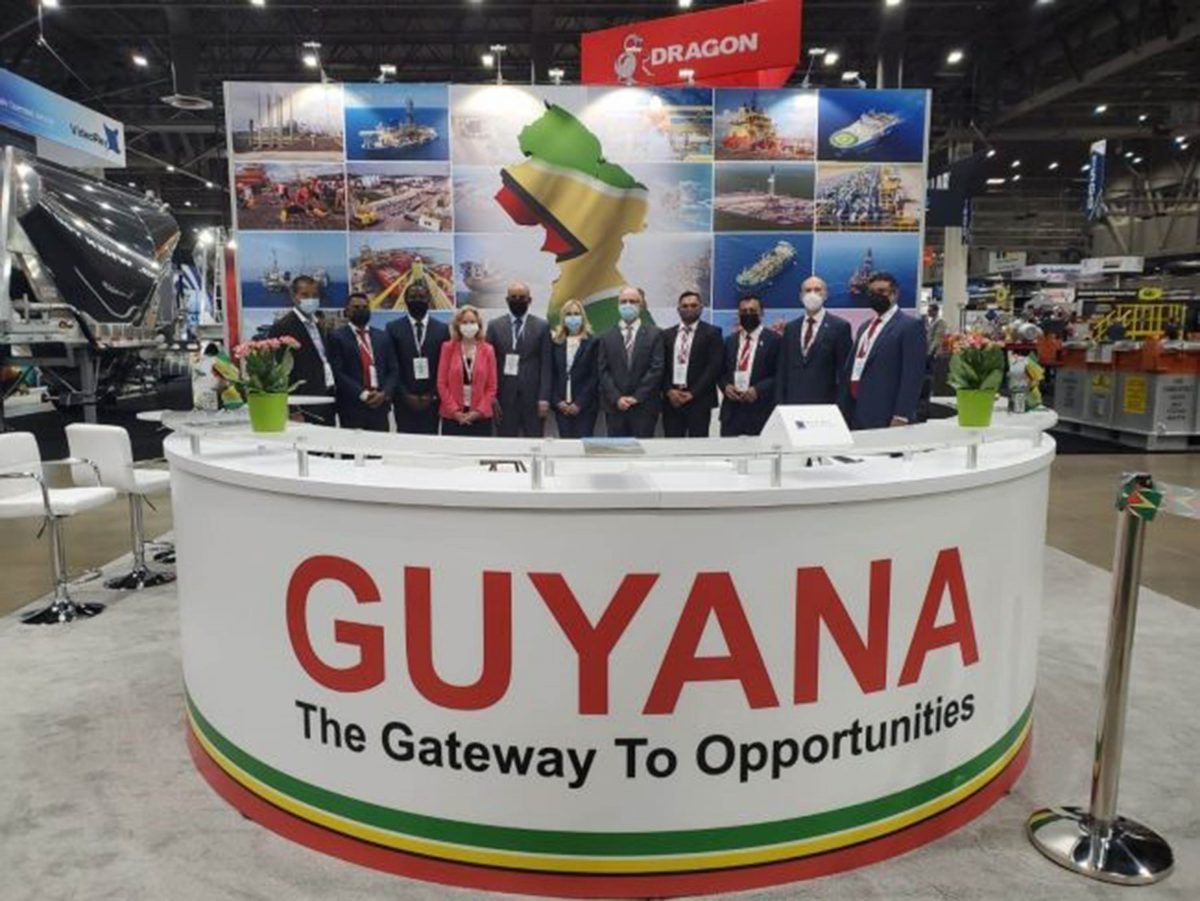Vice President Bharrat Jagdeo yesterday reiterated at the Offshore Technology Conference (OTC) in Houston, USA that the government supports the swift development of the local oil and gas sector as a means of earning as much as possible while global realities still allow for the use of fossil fuels.
It was one of the starkest admissions yet by the PPP/C administration, that in tandem with Exxon-Mobil and its partners, its intention was to extract as much of the nine billion barrels of oil equivalent and counting before the tide turns against fossil fuels.
“Because there is this Climate Change impera-tive to decarbonise, our policy is to get as much oil out of the ground as quickly as possible. It sounds a bit harsh for those who think you should be environmentally sound but that is the reality of it. We have to maximise the benefit from the industry and use those benefits to change our people’s lives… We don’t know how swiftly we’ll get to a decarbonised world but we have to make use of this period when there is still demand to get as much as possible out of the ground and that is why we support the rapid pace of the industry but it must be done safely,” Jagdeo declared.
The PPP/C administration has been criticised for not tabling an oil depletion policy.
During the one-hour engagement with Conference participants, Jagdeo repeatedly noted that while Guyana supports a decar-bonised future and is developing its own energy mix in line with the Low Car-bon Development Strategy (LCDS) the country will pursue the development of the Oil and Gas Sector.
“We will continue to advocate for a decar-bonised world, we will continue to pursue the LCDS and we will put in place the regulations to allow industry to develop in a safe manner and introduce cutting edge low-carbon technology that would also bring benefits to our people,” he declared.
Stressing that Guyana’s large swath of undeveloped forest area means that it will remain a carbon sink, the Vice President main-tains that the country “can grow this industry in a major way while maintaining environmental credentials.”
Speaking directly to those who have suggested that investment in fossil fuel development be halted, Jagdeo said it was not a fair request.
The UN-backed Production Gap report which was published in December 2020 has advised that countries must decrease production of fossil fuels by 6% per year, between 2020 and 2030, if the world is to avert “catastrophic” global temperature rise.
At the time of its release Inger Andersen, Executive Director of UN Environment Programme added that “Governments must seize the opportunity to direct their economies and energy systems away from fossil fuels, and build back better towards a more just, sustainable, and resilient future.”
On August 9th this year in the wake of a dire report by The Intergovernmental Panel on Climate Change, UN Secretary General Antonio Gutterres warned that fossil fuels were destroying the planet.
“This report must sound a death knell for coal and fossil fuels, before they destroy our planet,” Gutterres said in a statement.
“Countries should also end all new fossil fuel exploration and production, and shift fossil fuel subsidies into renewable energy”, he added.
Jagdeo posits that this should only apply to developed nations.
“Many have been saying that to get to a decarbonised future to get to a net zero by 2050 there should be no further investment in oil and gas assets….we believe that is totally unfair… The people who are calling for us to not develop the industry in a small country like Guyana have to understand that we cannot remain locked into a cycle of low emission and low income…our people have a legitimate expectation of prosperity. We have a legitimate expectation to grow the per capita income,” he said.
The Vice President added that since people will continue to use fossil fuels for the foreseeable future whether or not Guyana freezes investment therefore established producers will continue to earn.
“If we freeze all new investments…there is still a four trillion oil and gas industry that is producing for global demand. What those activists are doing is advocating that this investment be locked in for the incumbent. Why should we not want to displace some of the highest cost producers? We want a share in that market too. We want a share in that market. If there is no investment in countries like Guyana where the prospects are cleaner because it is light sweet crude and production costs are less then you are lobbying for a monopoly for the existing producers. So we believe that we can develop the industry in our country…we can do so by continuing to invest in a decarbonised future consistent with the LCDS,” he concluded.









